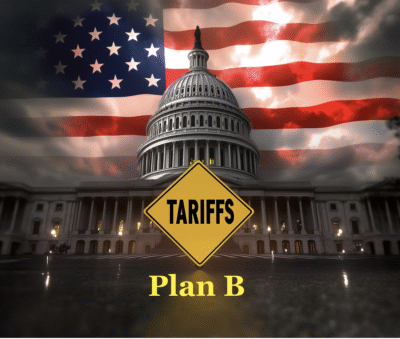Trump’s Plan B for Tariffs
By: Olivia Van Pelt, Law Clerk, BLG
On May 28, 2025, the United States’ Court of International Trade (CIT) struck down the President’s use of the International Economic Emergency Powers Act (IEEPA) to impose tariffs.[1] This includes tariffs imposed on Canada, China, and Mexico in response to the fentanyl crisis at U.S.’ borders and reciprocal tariffs imposed on almost all foreign imports on April 2, 2025. The Government immediately appealed the decision to the U.S. Court of Appeals for the Federal Circuit (CAFC).
Even if the Plaintiffs are ultimately successful, it is unlikely to impact President Trump’s plan to use tariffs as a mechanism to generate revenue, enhance national security, and leverage political power. White House deputy press secretary, Kush Desai, said in a statement to Fox News, “President Trump pledged to put America First, and the Administration is committed to using every lever of executive power to address the crisis and restore American greatness.”[2]
While the ruling recognized constitutional limits on the President’s power under IEEPA, the ruling did not fully reject his authority to impose tariffs. For example, President Trump has the power to impose certain tariffs under Section 232 of the Trade Expansion Act of 1962 if the Secretary of Commerce finds that an “article is being imported into the United States in such quantities or under such circumstances as to threaten to impair the national security.” The tariffs on steel, aluminum, automobiles, and automobile parts were imposed on Section 232 national security grounds. In addition, several ongoing Section 232 investigations could result in new tariff increases including copper, timber and lumber, semiconductors, critical minerals, pharmaceuticals and pharmaceutical ingredients, trucks, and commercial aircraft and jet engines.[3] Accordingly, these investigations and potential future tariffs imposed on behalf of U.S. national security are not affected by the court’s decision.
Additionally, President Trump can impose new tariffs in response to “fundamental international payment problems,” including substantial trade deficits, under Section 122 of the Trade Act of 1974. Under this authority, the President may impose tariffs of as much as 15% for up to 150 days. After the 150 days, Congress needs to sign off. If the President decides to take this route, Section 122 could potentially replace the current 10% reciprocal tariff aimed at addressing unfair and unbalanced trade.
Also, Section 301 of the Trade Act of 1974 gives the President the power to impose tariffs on foreign countries that violate U.S. trade agreements or engage in acts that are “unjustifiable” or “unreasonable” and burden U.S. commerce. The first Trump administration used this tool to impose tariffs ranging from 7.5% to 25% on four separate tranches of Chinese products worth over $360 billion. Some of these tariffs were later increased by both the Biden Administration and second Trump administration.
Section 338 of the Tariff Act of 1980 is another potential avenue for the President. Although never implemented by any President, Section 338 allows Trump to impose tariffs of up to 50% on countries who engage in trade practices that discriminate against the U.S.
The plan to use tariffs to achieve international policy is still in play with a number of different avenues for the Trump Administration to pursue. Despite the CIT’s ruling, businesses should consider taking proactive steps to minimize the impact of tariffs on supply chains that are easily disturbed by shifts in global trade. These steps may include reviewing tariff classification under the Harmonized Tariff Schedule (HTS), diversifying supply chains to lessen reliance on a single market, and consulting with professionals to ensure compliance with new trade regulations.
Braumiller Law Group PLLC will continue to update you on any new developments in the case.
If you have questions regarding how the CIT’s ruling may impact your business, feel free to contact Brandon French at brandon@braumillerlaw.com.
[1] https://www.cit.uscourts.gov/content/slip-opinions-2025
[2] https://www.foxbusiness.com/politics/federal-court-rejects-trumps-unbounded-authority-impose-worldwide-tariffs
[3] https://www.bis.doc.gov/index.php/other-areas/office-of-technology-evaluation-ote/section-232-investigations
Read more articles by these authors:

